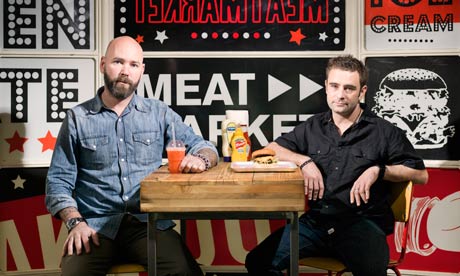
Everyone and their dog seem to be giving street food a go, but how do you make a living from it? If there's a man who knows, it's Yianni Papoutsis. After 15 years as a production technician for the English National Ballet, he opened his street food burger van, MeatWagon, in 2009, keen to take his life in a brand new direction.
Although he could not leave the day job until he set up the MeatEasy pop-up in a pub in London's New Cross in early 2011, the combination of obsessive passion and assistance from some "grown-ups" means he has become one of Britain's biggest street food success stories and how has two permanent sites in London: MeatLiquor off Oxford Street and MeatMarket in Covent Garden.
Location, location, location
Although intrepid foodies will travel far and wide for their fill, location is key, says Papoutsis. "The original MeatWagon site was in the grottiest, most backward industrial estate in Peckham. And, although people came, it wasn't until I started doing the MeatEasy pop-ups at some of the pubs run by my now business partner [Scott Collins, who operates seven pubs across south-east London] that it really blew up. My food was exposed to so many new customers there, and the right customers.
Collins agrees: "Going to where the foodies already are is just a good move all round – if they don't have to travel far, they're more likely to keep coming back, and you can get friendly with familiar faces – that's how word of mouth spreads and that, with street food, is important, because there is so much out there. You need to become a destination."
Your supplier is also your friend
Despite co-owning two of central London's busiest restaurant sites, Papoutsis sees little reason to change the suppliers he has used since day one. This, he says, played a great part in his success. "I have worked with the same meat and bun suppliers since the first day I opened the hatch on the MeatWagon van," he says, propping up a table in MeatMarket, his T-shirt clinging to his small frame with sweat (he'd just sprinted over from MeatLiquor). "The key is not to just be a customer. Through developing a great relationship, they nurtured me when I was only buying a couple of kilos of meat, and were very patient with my lack of experience. Now I show that loyalty back – the bakers of our buns, for example, have had to buy a new £35k oven each time we've opened a new site."
Hang out with grown-ups
You can make the best burgers in the world but, if you want to expand and make decent money, you'll struggle to fulfil your potential without some basic business know-how. Papoutsis's advice: find a knowledgeable adult. "Numbers scare the shit out of me," he says. "But to make money with a DIY food business, you need all that. There's so many layers of knowledge you need apart from the food. Scott is my grown-up. I've always believed in my food, and never really had any plan at the beginning apart from making as many burgers as possible, but without him I might have still been in that industrial estate. Now we're turning over millions." Not that they're rich, he stresses. "It all goes straight back into the business, into the best equipment, paying staff, things like that."
Other people's money will come in handy
Equipment, good produce, tools, fuel, promotion – the costs of running a street food business all add up. If you want to expand to more than one location, or set up a permanent site, you will probably need to start thinking about looking for investors, and the earlier you start doing this the better. "I have a team of investors that own a minority stake in the business," says Papoutsis. "Friends, family, supporters – if they can each help a little bit, it adds up. Having financial reserves is often the only thing in the way of a street food business expanding – if you can't keep up with demand, you'll lose out."
Keep your van in a very safe place
If a van is the heart of your business, lock it up. Papoutsis learnt the hard way. "The first MeatWagon van was badly vandalised before a big festival – it was ripped to shreds and was totally unusable. That's a shitload of money I missed out on making." So what did he do? "Scott kindly leant me the money to buy another one. But that got stolen before Christmas – a time of year that's another great opportunity, business wise."
Van or no van, Papoutsis refused to give in. "This leads me on to my final bit of advice – be adaptable. I didn't have a van, but people still turned up at the pubs wanting my burgers, and I ended up cooking on rented griddles out in the snow, my feet turning into ice blocks. You have to be a bit wiley in this game."

